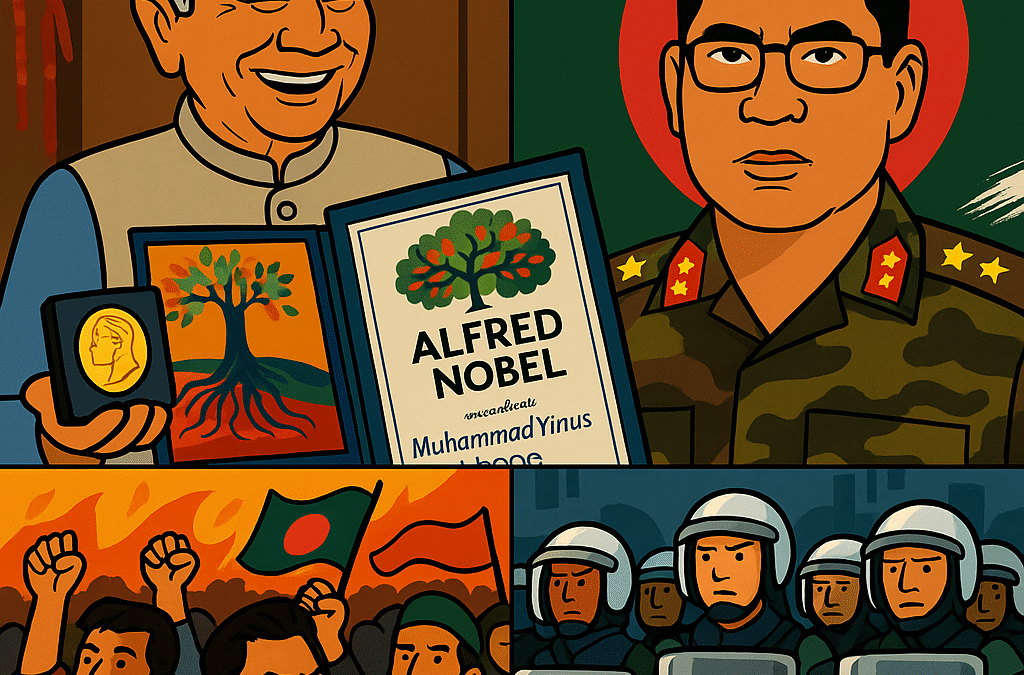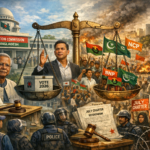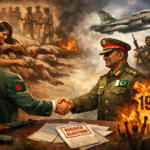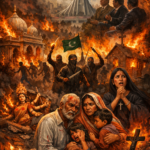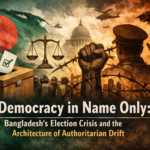A year after the “monsoon revolution,” which path?
A year on from the July–August 2024 student uprising that toppled a 15-year regime and ushered in an interim administration led by Nobel laureate Muhammad Yunus, Bangladesh stands at a forked road. The choice is stark: institutional democracy or a politics of streets and mobs; rule-of-law accountability or rumour-driven vendettas; inclusive pluralism or a narrow majoritarianism that corrodes the republic’s founding promises.
The interim government consolidated itself in 2024–25 with sweeping moves—among them bans on the Awami League’s activities and its student wing—framed as necessary to address deadly abuses during the crackdown that preceded the regime’s fall. Whether those actions were prudent crisis management or overreach with long shadows is now the central argument shaping Bangladesh’s near future.
The democratic test: institutions vs. improvisation
Bangladesh’s democratic transition hinges on one hard question: can institutions be rebuilt faster than street politics can unravel them? Human Rights Watch’s January 2025 roadmap urged security-sector reform and due process as the spine of any credible election. That remains unfinished business. A credible vote—on time, with plural participation and civil liberties intact—would do more to anchor the transition than any decree. Delay risks normalizing rule by exception.
Analysts warn the political field has tilted in ways that empower both populist and Islamist forces. Reports in The Diplomat argue that de-emphasizing counterterrorism and disempowering security agencies created space that militants and hardliners could exploit. Al Jazeera meanwhile chronicles a climate where revolutionary zeal, bans and tribunals coexist with factional rivalries and a contested reform agenda. These aren’t abstractions; they are the ambient risks around any election calendar.
Mob justice: a symptom of institutional exhaustion
Perhaps the most corrosive trend is the rise of mob justice—the substitution of rumor, livestreams and vigilantism for investigation, prosecution and trial. Oxford’s Human Rights Hub calls it a betrayal of the right to life; recent studies track how Facebook/TikTok rumor mills accelerate moral panics into violence. Local reportage describes incidents where crowds took “justice” into their own hands. If courts, police and prosecutors don’t visibly work, mobs will. And once normalized, mob trials rarely stop at the “bad guys”—they become a weapon against minorities, women, dissenters and political opponents.
International coverage has also highlighted intimidation of journalists and artists. The Committee to Protect Journalists (CPJ) notes continuing detentions, investigations and attacks—a reminder that freedom of expression is the canary in the democratic coal mine. HRW’s March 2025 call likewise pressed the interim government to protect speech not only from the state but from non-state violence.
Judiciary under pressure: lessons from 2024
In August 2024, Bangladesh’s Chief Justice agreed “in principle” to resign after student protest ultimatums, and soon stepped down. No matter one’s view of that particular officeholder, coercing constitutional actors by crowd pressure is a perilous precedent. Courts must be accountable—through law—not through siege. The line between legitimate protest and obstruction of constitutional functions is the line between democracy and mob rule.
That lesson matters in 2025 as new tribunals and legal innovations gather pace (including the unprecedented move to prosecute entire political parties under amended provisions). Each legal step must meet due-process standards, avoid collective punishment logic, and ensure rights of defense—otherwise the “rule of law” looks indistinguishable from victor’s justice.
Rumors of graft: allegations, denials, and the burden of proof
In August 2025, a former civil servant publicly accused eight interim advisers of corruption; the cabinet secretary urged the accuser to submit evidence to legal authorities; leading dailies framed the claims as “unsubstantiated,” and the episode remains contested. What matters is the state’s response: transparent inquiries where credible complaints exist, whistleblower protection, asset declarations, procurement transparency, and judicial review. Allegations must neither be weaponized nor waved away; they must be adjudicated—quickly and fairly.
The pluralism stress test
Minority safety is the bellwether of any transition. Reporting has catalogued hundreds of attacks against minority communities since the upheaval, alongside mass mobilisations by Islamist groups against proposed women ’s-rights reforms. The state can (and must) manage public order without capitulating to majoritarian intimidation. Protecting temples, churches, Ahmadi mosques, Shia processions, and secular gatherings is not “optional”—it is a constitutional duty.
The street abroad: diaspora signals
Bangladesh’s politics now spills into world capitals. A recent London visit by an interim adviser drew intense protests from Awami League supporters in the UK, with videos ricocheting across social media. Diaspora activism can enrich debate, but it can also import polarisations and disinformation. Statesmanship demands engagement without exporting street confrontations.
What would a “to be” future look like?
-
Time-bound elections under enforceable ground rules. Publish an election calendar and stick to it; empower an independent election body; enforce a level playing field; allow monitored campaigning; protect rallies across the spectrum; prosecute violence fast, whoever the perpetrator.
-
Rebuild rule-of-law capacity. Implement HRW’s security-sector reform benchmarks; equip prosecutors and courts; create fast-track but fair procedures for political-violence cases; end collective guilt theories; make custody safe and courts accessible.
-
Zero tolerance for vigilantism. Treat lynching and “people’s trials” as top-tier crimes; rapidly debunk rumours via official channels; partner with platforms to throttle the virality of doxxing and incitement; prosecute instigators, not only hands-on attackers.
-
Protect speech, especially speech you dislike. Drop overbroad charges against journalists; secure book fairs and campuses; ensure police neutrality when party activists or vigilantes threaten writers and editors.
-
Guard pluralism. Back minority protection with budgets, policing, and prosecutions; condemn hate speech from all sides; rein in parties and preachers who incite violence; ensure women ’s-rights reforms are debated by evidence, not bullied by crowds.
-
Transparency against graft. Publish adviser/minister asset declarations, mandate e-procurement, empower an independent anti-corruption commission insulated from factional pressure, and route all credible allegations to court.
And the “not to be”?
The alternative is already visible: bans turn from emergency scaffolding to permanent fixtures; tribunals drift into political theatres; rumour replaces reportage; crowds replace courts; minorities retreat; women’s rights stall; journalists self-censor; diaspora politics gets angrier; militants test the seams. At that point, “revolution” ceases to be a passage to democracy and becomes its alibi.
Hamlet’s phrase is not a metaphysical riddle here; it is a civic choice measured in deadlines met, rights protected, and mobs deterred. Bangladesh can still choose to be.
Bibliography
-
Human Rights Watch. Bangladesh: Roadmap for Democratic Transition. January 2025.
-
Committee to Protect Journalists (CPJ). Attacks on Journalists in Bangladesh, March 2025.
-
Al Jazeera. “Bangladesh’s interim government faces challenges of legitimacy.” 2024–25 coverage.
-
The Diplomat. “Bangladesh’s Security Sector and Risks of Islamist Resurgence.” 2025.
-
Oxford Human Rights Hub. “Mob Justice and the Right to Life in South Asia.” 2024.
-
The Daily Star (Dhaka). “Adviser corruption allegations contested.” August 2025.
-
bdnews24.com. “Cabinet secretary calls for evidence on graft claims.” August 2025.
-
Reuters/AP. “Bangladesh protesters demand judicial resignations.” August 2024.
-
Atlantic Council. Bangladesh’s Transition at a Crossroads. Policy Brief, 2025.
-
Local and regional Bangladeshi press reports (Prothom Alo, New Age, Jugantor, etc.) on minority attacks and mob incidents, 2024–25.

